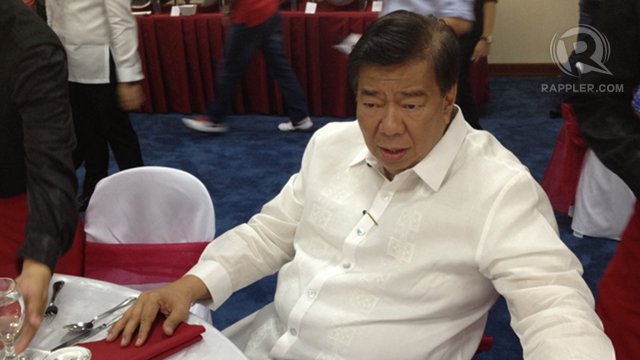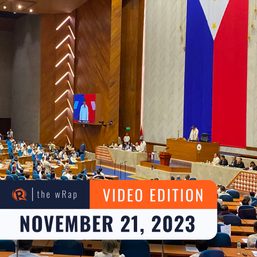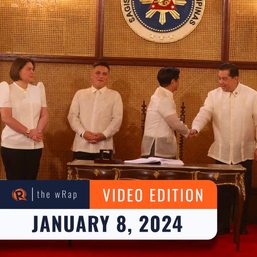SUMMARY
This is AI generated summarization, which may have errors. For context, always refer to the full article.

MANILA, Philippines – Will 2014 bring in the long-debated changes to the basic law of the land?
Senate President Franklin Drilon said the chamber is willing to consider the plan of House Speaker Feliciano Belmonte Jr to push for amendments to the economic provisions of the 1987 Constitution next year.
“We are open to it. We will see how these debates develop and we will take a position at the appropriate time. There must be consensus among the political leaders because this kind of political exercise must have the support of the unified political leadership,” Drilon said in a press briefing on Thursday, December 19.
Despite the possible consensus between Drilon and Belmonte, President Benigno Aquino III is unconvinced of the need to change the Constitution, whether for economic or political reasons. Drilon and Belmonte have long proposed changes to the Constitution but failed to sway the President.
Aquino has consistently said that he does not see charter change as a necessity for economic growth.
Drilon said he and Belmonte have not discussed the idea lately. Still, he said the Speaker’s preferred mode of changing the Constitution is similar to his proposal two years ago.
“When we propose amendments to the Constitution, it must be in the same manner as we pass laws but the voting will be done separately and in the qualified majority as provided in the Constitution, meaning three-fourths of each house voting separately and is submitted to ratification,” Drilon said.
Drilon was responding to Belmonte’s plan to secure votes for the passage of a charter change resolution that will allow changes to the 40-percent cap on foreign ownership of land, public utilities and other key industries. Belmonte’s resolution wants to add the phrase, “unless otherwise provided by law.”
“So the amendment is not yet there. It is just to authorize the Congress to propose amendments for the economic provision without necessarily touching every word and phrase in the Constitution,” Drilon explained.
The Senate leader recalled that the chamber rejected a 2009 proposal to change the Constitution through a constituent assembly where the Senate and the House were set to vote jointly.
Back then, lawmakers clashed on the interpretation of the constitutional provision that Congress may change the charter “upon a vote of three-fourths of all its members.”
“You might as well abolish the Senate because the Senate is just 24 as against the House’s 270 votes. That is why there is resistance. But if we vote separately, as separate houses of Congress, then that possibility would not happen,” Drilon said.
Charter change for investments?
Drilon said he prefers that the constitutional changes be limited to the economic provisions.
“Because the economic provisions set the policies on the economy and many are of the view that the very restrictive provisions of the Constitution on the economy are hampering our ability to compete with our neighbors,” he said.
Yet last July, Drilon said in an interview on Rappler’s #TalkThursday that charter change is not needed to foster growth. He said Congress will take the legislative route and focus on priority economic bills to address the concerns of charter change proponents and criticism of non-inclusive growth.
Senator Miriam Defensor Santiago, chairperson of the committee on constitutional amendments, has shot down proposals to change the Constitution. She said corruption, not the Constitution, is what turns off foreign investors.
Like the President, Santiago said she is not convinced that allowing greater foreign ownership of land and other key assets will lead to economic growth.
“There is no direct relationship in other countries. If there is economic boom, it was not because of ownership but other factors. And if we changed our minds because we saw it did not boost our economy, we can no longer take them back. That is my main inhibition there,” Santiago said last July.
Santiago said that charter change is also a question of feasibility. She said proponents must convince her that they can muster enough votes in the Senate and the House.
“Is it necessary? Does everything have to hang on a dime, on this one issue? Is it beneficial, three is it practical? Who is going to foot the bill?”
Is 2014 the proper time?
Another question is timing. With the Philippines struggling to mount a massive P361-billion rehabilitation effort after Super Typhoon Yolanda (Haiyan), is 2014 the best time to change the Constitution?
Drilon responded, “Every time that question comes up, the question being raised, ‘Is it the proper time?’ At the end of the day, it would depend on the people where in the process of ratification, they themselves would decide whether it is proper at this point to amend the Constitution.” – Rappler.com
Add a comment
How does this make you feel?















There are no comments yet. Add your comment to start the conversation.